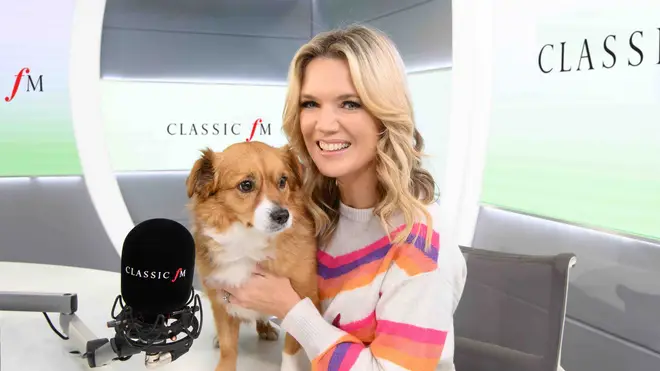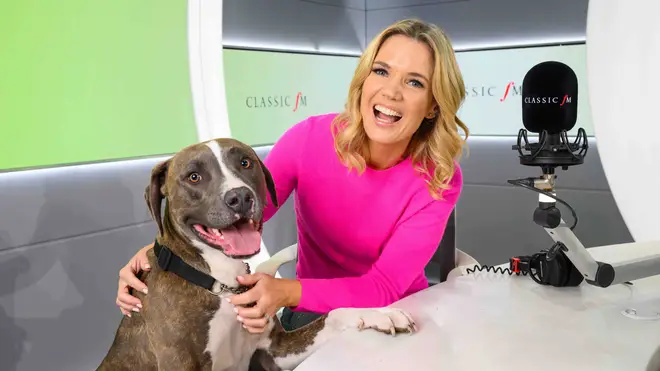How to keep your pets safe this firework season, according to the RSPCA
19 December 2023, 18:07

The RSPCA’s tips for keeping your pets calm on Bonfire Night
The RSPCA shares its top tips for pet safety during fireworks season, ahead of Classic FM’s Pet Classics and our special shows to help keep furry friends calm and happy.
Bonfire Night and the season of firework displays can be a stressful time for our beloved pets – and their owners.
Every year, we bring you special shows filled with classical music to keep your pets calm and reassured during the fireworks, as well as tips from experts on how to best look after nervous four-legged friends.
On Saturday 4 November and Sunday 5 November 2023, join us for Classic FM’s Pet Classics hosted by Charlotte Hawkins, followed by a three-hour programme on New Year’s Eve, with Katie Breathwick.
We’ve worked with our friends at the RSPCA to bring you the latest advice for keeping pets safe and stress-free amid the lights and loud noises of Bonfire Night.
A 2022 impact survey by the RSPCA found that 76 percent of respondents reported dogs experiencing distress as a result of fireworks. Previously, the animal charity has revealed that playing relaxing music is the most common way pet owners help relax or prepare their animals for Bonfire Night.
Watch the tips from the RSPCA above, as Lucy Cooper talks to Charlotte about the best ways to look after your pets during this stressful time.

RSPCA’s practical advice – preparing for fireworks night
- Provide your dog or cat with a safe haven. Create a doggy den in a quiet area of the house and make it a special safe place by placing tasty treats and favourite toys inside. Make sure your cats always have access to plenty of places around the house to hide.
- Pheromone diffusers. Speak to your vet about using a calming collar or diffuser which disperses calming pheromones which may help your dog or cat feel more secure.
- Introduce changes to your pet’s routine slowly. It’s sensible to keep your horse in a familiar environment, following their normal routine with their usual companions. If you’re planning to bring your horse or livestock into a stable or barn overnight during fireworks, start to introduce the change of routine now to get them used to being in. We recommend walking dogs during daylight during fireworks season so if this is different to your normal routine, begin to alter the time of your pet’s walk to get them gradually used to it.
- Provide extra bedding. Rabbits, guinea pigs and other small animals who live outside should have extra bedding to burrow into or you can cover their housing with a blanket for extra sound-proofing. Begin to introduce this now.
- Bringing pets inside. If you’re planning to bring them indoors to better protect them then start to make this change ahead of fireworks night to get them used to the new sights, smells and sounds inside.
- Speak to neighbours. If you want to plan for dates of local displays then check local press and websites and speak to your neighbours and local councils/schools etc to find out dates ahead of time so you can plan now to help your pet. Ask organisers to site fireworks well away from your horse and aimed in the opposite direction.
- Soundproof your house. Simple steps like closing windows and curtains can help your house seem safer to your pet so begin doing this now if it’s different to normal to get your pet used to it.
- Start desensitising them to sounds. Teach your pet to deal with the sounds by using training CDs. We recommend Sounds Scary which comes with guidance on how to use it. You can also muffle the sound of fireworks dogs and other pets by using calming music like classical playlists and Classic FM – start to introduce this now. This is a long-term approach so may be worth starting now ahead of next year.
- Get help. If your pet has a severe fireworks fear then speak to your vet or clinical animal behaviourist now to come up with a plan or to discuss whether there are any treatment options to help them.
Listen on Global Player: Classic FM’s Music for Pets playlist

Fireworks affect Pets
If you want to have your own celebration
- Only let fireworks off on traditional celebration dates
- Use low noise fireworks
- Let your neighbours know well in advance, including those with horses nearby
- Never set off fireworks near livestock or horses
- Don’t let off fireworks if they’ll disturb nearby wildlife habitats, or roosting bats or birds
- Build any bonfire as close as possible to the time of lighting, to reduce the risk of wildlife making their home inside
- Pick up firework debris and litter after it has cooled down
Keeping pets secure
- Walk dogs during daylight hours and keep dogs and cats indoors when fireworks are likely to be set off
- At nightfall close windows and curtains - put on calming music such as Classic FM to mask the sound of fireworks
- Make sure your pet can’t escape if there’s a sudden noise, and remember to make sure your pets are microchipped and keep your microchip details up to date
- Never punish your pets when they are scared as this will only make things worse in the long run
- It’s fine to comfort your pet if it helps them relax, or leave them alone unless you think they will harm themselves

Guidance just for dogs
- Close any windows and black out a ‘doggy play area’ so that your dog can’t see the flashing lights
- Ignore any fireworks yourself
- Play with a toy to see if your dog wants to join in but don’t force them
- Before the fireworks begin move your dog to the doggy play area with all their favourite toys
- Ask your vet for advice about pheromone diffusers and possible referral to a clinical animal behaviourist for help – they can give you advice on how to help your dog become less afraid of loud noises in the long-term
Guidance just for cats
- Make sure your cat has somewhere to hide if they want to. For example, under some furniture, in a cardboard box or in a quiet corner. Don’t try to tempt your cat out as this will cause them to become more stressed
Bonfire Night guidance for small animals
- If your pets live outside, partly cover cages, pens and aviaries with blankets so that one area is well sound proofed. Make sure that your pets are still able to look out. Provide lots of extra bedding so your pets have something to burrow in
Fireworks guidance for horses, ponies and donkeys
- Check for any firework displays planned locally and, where possible, ask organisers to site fireworks well away from your horse – aimed in the opposite direction
- Keep your horse in a familiar environment, following their normal routine with their usual companions. If your horse is staying in their field, check the fencing is secure and there are no dangerous objects they could collide with if startled.
- If stabled, make sure hay nets are secure so your horse can’t get caught up
- You should stay with your horse if you know fireworks are going to be set off, but do be aware of your own safety – a startled horse can be dangerous



































